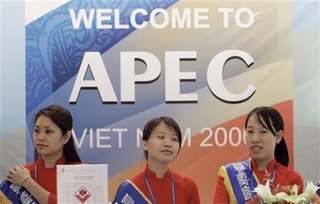The Ubiquitous Press Statement of International Meetings
 Greetings from Hanoi. Today's post is not about Brunei per se but just a little information guide to those who are curious as to what ministers and officials actually discussed when they go overseas attending international meetings. Attending international meetings sounded so glamorous but in reality, it is anything but. Though if you speak to my colleagues in the foreign service, they find the excitement of attending meetings somewhere near the orgasmic level.
Greetings from Hanoi. Today's post is not about Brunei per se but just a little information guide to those who are curious as to what ministers and officials actually discussed when they go overseas attending international meetings. Attending international meetings sounded so glamorous but in reality, it is anything but. Though if you speak to my colleagues in the foreign service, they find the excitement of attending meetings somewhere near the orgasmic level.I spent the whole of yesterday leading Brunei's delegation (me and 1 officer! - macam basar (ours is the smallest delegation)) at the Deputies Meeting (Level of Perm Sec/Deputy Minister - note in some countries like China and Japan, their Deputy Minister is the PS). The meeting was mostly briefing and listening to us talking to each other what we have done in our economies and also to listen to other experts about finance, world economic issues, financial sector reforms, capital flows etc. It's enough to put a lot of people to sleep but unfortunately to us finance people, it is our bread and butter. Anyway, the interesting part was not in the meeting but in the drafting committee session where two giant economies could not agree on the language of one sentence in the press statement. The rest of us just watched as we were pretty agreeable to a number of options but unfortunately these two have their instructions from their capital.
Press statements or press communique (sometimes also called ministerial statement) is an interesting document. Most of us who are not involved in the higher level meetings will never get to know about what was actually said or discussed in the Leaders and other senior Ministerial meetings. There is always a few inches thick report which will be given to every delegation at the end of the meetings - but those reports are confidential and not many have access to them. So what the news people report is the press statement of the meeting. This is the document that goes out to tv news and newspapers and therefore the language in the statement becomes the utmost importance to every country involved in the meeting. There have been cases where hours have been devoted to discuss whether or not an 'a' or a 'the' should be inserted in a sentence.
Since the press statement becomes the most important document, great care has been taken to ensure that it represented the right tone and setting of everyone who attended the meeting. And the only way to ensure that is that the statement should be circulated earlier so that everyone can have a look at it and give their comments. So you have a very strange situation where the leaders or the ministers haven't even met yet but a few months or weeks earlier there is already a draft press statement which has been circulated about the issues that these ministers were supposed to have discussed during the meeting (or in this case will be discussing). Very prophetic!
The one thing that I found most interesting is that come the actual meeting, given the short time frame, the leaders or ministers don't exactly discuss those issues (some of the issues are discussed at the lower level or some of the issues are in the documents) but sometimes only alluded to it in their prepared speeches. So during the ministerial meetings, everyone reads their respective speeches or intervention notes and not exactly discuss about the issues that are stated in the press statement. So where does the real meeting take place? It's at the drafting committee!
So why should ministers attend meetings then? Why not just have a teleconference? It's probably cheaper. One of the important thing we have to remember is that diplomacy requires people - physical people. So the ministers have to come and see each other and this also means that we respect the association that we belong to and that we belong. Secondly, the ministers also get to network and this may become important one day for our country to have relationships with other countries. Most importantly, the Ministers have to endorse what we do. And sometimes when the senior officials could not agree on the language etc of the documents especially the press statements, they get to make the decisions. They are the politicians after all.
So come Friday, after the Ministers meet, what will be the press statement? Yahoo News has already reported it, you can read it here.
Caveat: not all international meetings are like the above. The above is more fitting for higher level diplomatic and policy meetings. Most other international meetings are on a practical level where actual discussions about what needs to be done and those are more 'fun' as there is substance to talk about. Though my foreign service colleagues would find this to be the opposite.
 PS. I saw this shop sign in Hanoi the other day. So, do you want to have your food massaged?
PS. I saw this shop sign in Hanoi the other day. So, do you want to have your food massaged?I have a number of other equally interesting photographs taken in Hanoi over the last few days. You can see them here.


Comments
Similarly in other situations, work/diplomacy must not only be done, it must be seen to be done..
;)
Immunologist